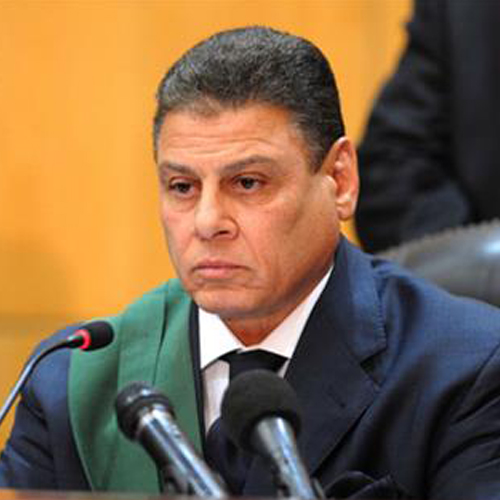Judge Mohamed Shereen Fahmy graduated from Law school at Cairo University and served as an assistant prosecutor in Asyut.
He ascended the prosecutorial ladder until he became the president of the Public Funds Supreme Prosecution; president of Financial Affairs Prosecution; president of Tax Evasion Prosecution; public defender of North Cairo Prosecution; and public defender of East Cairo Prosecution.
He took a leadership position in the State Security Affairs Office.
He worked in judicial inspection and was a member of the Felonies Court in 1995-1999.
He investigated many of the most important and notorious cases in the 1980s and early 1990s.
One such case was “The Great Bribery” case in 1986, involving 27 undersecretaries of the Ministry of Industry. This case was described as the case of “Fighting Corruption in Positions of Leadership”.
He also investigated Al “Rayyan’s” misappropriation cases including the “Yellow Corn Deal” in which Al Rayyan was investigated in collusion with the Development and Credit Bank in 1986.
This deal resulted in a crisis pertaining one of Egypt’s most important crops.
From 1999 to 2005, Judge Mohamed Shereen Fahmy served in the State Security Affairs Office.
From 2006-2015, he served as the president of Cairo Felonies Court.
After the June 30 events his responsibilities grew; he served as the president of circuit No. 11, the Cairo Felonies Court, responsible for adjudicating many of the terrorism cases related to the Muslim Brotherhood. On September 19th, 2013, he suspended the retrial of Ahmad Ezz in the case of money laundering until the adjudication of the related cases of “iron license” and “Al Dekhila”, in which Ahmad Ezz was involved. He also ordered his release on bail of 100 million L.E., while he added him to the travel ban list.
On July 17th, 2019, the president of Appeal Court issued an order establishing a special unit for terrorism circuits. Judge Mohamed Shereen Fahmy served as its president. He also presided over the “Judges for the Sake of Egypt” case where he removed 40 judges from the different judicial bodies.
He investigated the case of wiretapping the public prosecutor’s office in which the Judge Talaat Abdallah and Hassan Yassine, the former assistant to the public prosecutor, were accused. He also investigated the media squandering of public money case in which many judicial bodies were involved.
He investigated judges involved in the Judicial Independence Movement where the judges were accused of signing a statement supporting the Muslim Brotherhood.
This case involved 75 judicial figures, including Judge Hesham Genena, the president of the central auditing department; Judge Ahmad Mekki, previous Minister of Justice; Judge Mahmoud Mekki- former Vice President; and Judge Mahmoud Al Khudhairi. He referred 60 judges to disciplinary action.


